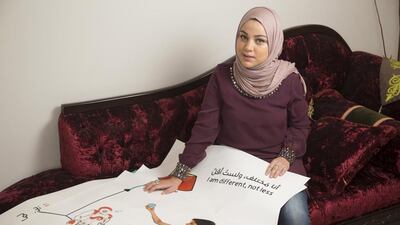SHARJAH // Like many 21-year-olds, Palestinian Nour Khalid enjoys movies, swimming and keeping fit, but her ambition is what sets her apart from her peers.
Ms Khalid hopes to launch Tayf School for Autistic Children, which would be the first custom-created school in the UAE for autistic children.
The graphic design and multimedia graduate of the College of Fine Arts and Design at the University of Sharjah dedicated months of her life to drawing up the designs for the Tayf school as a graduation project.
“This project sums up my ambition in life because I want to extend a helping hand in spreading awareness among parents of autistic kids who have lost hope and some of them believe their kids will never be cured or improve,” says Ms Khalid.
The school’s main goal will be to provide therapy to autistic children in an environment designed to help them demonstrate their abilities and potential.
Her research into teaching autistic children has led her to Nao, a French-made autonomous, programmable robot.
The small, humanoid robot is programmed to teach autistic children about human communication and emotion.
“The robot’s behaviour can be customised to suit different scenarios, consequently, it has the capability to offer a simpler interaction with the children,” she says.
“These two complementing factors make robots an ideal medium to be used in autism therapy.”
Ms Khalid says that for children with an autism spectrum disorder, body language and facial gestures carry a huge amount of information that can sometimes be overwhelming.
“This task could be extremely complex for ASD children and can affect their interaction with the caregiver,” she says.
“The simplified, human-like face of the Nao robot will help children easily interpret its social signals and, in particular, they will pay more attention to its non-verbal communicative cues.”
Ms Khalid says the robot can use applications that will allow the children to improve their verbal and non-verbal communication skills, as well as help build their emotional intelligence and basic academic skills.
She hopes that one day her project will receive the funding to turn it into reality.
She has five siblings, all of whom she says are supported and encouraged by their parents to dream and work towards making a difference in people’s lives.
Her autism project, which was carried out under the supervision of Dr Shaima Elbardawil, was showcased at the 2015-2016 graduation projects exhibition at Sharjah University.
Ms Khalid was recognised for the project at a graduation ceremony.
salamir@thenational.ae


